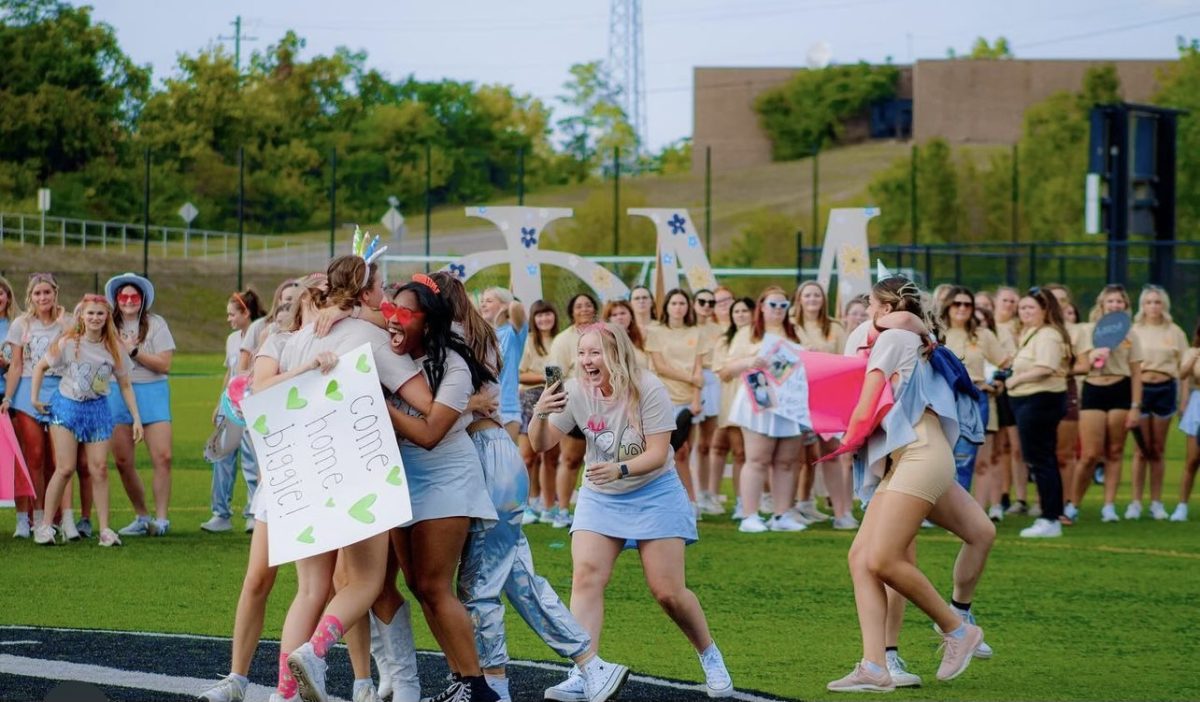
Over the last five years, involvement in Greek life at NKU has decreased drastically, sparking questions as to why this is occurring.
Throughout this semester there will be informal recruitment across NKU’s Greek life organizations. Several of these groups will have numerous dates throughout the semester to allow for exposure of each chapter.
Greek life at NKU consists of three councils and one association: National Pan-Hellenic Council (NPHC), Panhellenic Council (NPC), Interfraternity Council (IFC) and Multicultural Greek Organizations. These oversee 23 chapters and organizations, coming to a total of 607 undergraduate students for the 2022-2023 academic year.
Beginning in 1972 with the first sorority being Delta Zeta and first fraternity of Pi Kappa Alpha, the presence of Greek life on campus began to flourish with the addition of several new chapters. Throughout the next three decades, NKU continued to add more organizations, growing from the first two to now a total of 23.
According to a 2015 Annual Report from the NKU Office of Fraternity and Sorority life, 12% of the undergraduate population at NKU was a part of Greek life. Along with this, a report of membership showed an increase of 2.5 times from 2006 to 2016, with 1,318 students as a part of Greek life in 2016. Though within the next four years, numbers began to drop, reaching 933 members in 2020.
Ellie Enslen, a senior and three-year member of Kappa Delta weighed in on why she thinks enrollment is low. “Recent social media trends like #BamaRush has really given Greek life as a whole a bad reputation. People immediately think these stereotypes are in place when in reality, NKU is nothing like that,” said Enslen.
Beginning her Greek life journey as a sophomore in fall of 2021, Enslen stated she went into recruitment with an open mind and the goal to meet new people. “It’s really just what you put into it and the effort you make to be a part of a group,” said Enslen.
Based on several college reports, it seems that this is not just a problem NKU is dealing with. Starting with the “abolish Greek life” movement in the summer of 2020, support quickly grew for the awareness of toxicity in these chapters. Student members across America made reports of hazing, harassment, discrimination and costly dues, sparking recognition toward what was occurring at these universities.
Director of Student Engagement Brittany Jackson took her position in the Student Engagement Center in 2022 and believes that NKU Greek life members have come to appreciate how it stands out from other universities. “It is a much more welcoming and intimate environment than any other Greek life campus I have seen,” said Jackson. She pointed out that many students at NKU join Greek life simply because they want to be Greek and care for the community.
“The student demographic here is much different than University of Kentucky or University of Louisville, being that a large percentage here are commuters,” said Jackson.
Frederik Smal, a sophomore business student at NKU, mentioned that he did not want to be a part of Greek life because many of his values did not align with the chapters, making it something that was simply not on his radar from the beginning. Although this community is not for him, Smal stated that it is still a unique group that is different from other colleges. “I’ve kept a positive notion towards the Greek life community because there's really no extremes here that you see happening at other universities,” said Smal.
Being a part of several other campus organizations, Smal stated that fraternities and sororities here have created positive impacts and intertwined their work with neighboring communities. Based on the 2018 Annual Report from the NKU Office of Fraternity and Sorority life, a total of 27,000 community service hours were completed, equaling $165,000 raised in philanthropy.
While obstacles for increasing campus participation only seem to rise, Julia Pohl, Panhellenic president, has begun making efforts to increase Greek life involvement. Pohl, a junior and member of Kappa Delta, stated that she wants to educate more people about Greek life by reaching out to local high schools and creating scholarships that would aid in covering dues. In May, Pohl will be disaffiliating from Kappa Delta to take part in recruitment for Panhellenic Council.
For more information about Greek life recruitment this semester, check out NKU’s Center for Student Engagement in the Student Union and on social media.

